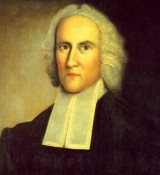Over the past few weeks, I have been part of a group from Redeemer Community Church that is poring over Jonathan Edwards’ Religious Affections. Lest it become overwhelming, we have taken our time; so we are only now coming to the end of Part 1.
In this section of the work, Edwards has been buttressing his basic thesis: True religion, in great part, consists in holy affections. Edwards’ support for this is broken up into 10 basic points, which I will not discuss here. However, below is a presentation that runs through each of these in summary fashion.
My concern on this post has to do with the final three points of the chapter, which Edwards calls inferences based on this thesis. Here are his 3 concluding statements for Part 1, slightly reworded into imperatives:
1. Reject the fallacy that denies that religious affections are of no substance.
With this point, Edwards wages war against the extremes, particularly those who see no validity to the religious affections, such as love, zeal, hatred of sin, thankfulness, etc. The church has a tendency to bounce between two poles:
- seeing all affections as evidence of true grace without distinction
- rejecting all affections without distinction
In discussing the latter, Edwards’ writes that Satan works “to bring all religion to mere lifeless formality” (emphasis added). The result is to “shut out the power of holiness, and everything that is spiritual.” He thus warns that there is an equal tendency to have light without heat (i.e., knowledge without an affected heart) or to have heat without light (i.e., vigorous affections without knowledge). Either is incorrect, but to deny affection in totality could serve to harden hearts, to encourage stupor, and to keep men in a state of spiritual death.
Since there are false and true affections, a correct approach, according to Edwards, would be to distinguish between the affections, thereby separating the wheat and chaff. Don’t reject all affections; but at the same time, don’t approve all affections.
2. Embrace the means that tend to most move the affections.
Building off of earlier parts of the chapter, Edwards reiterates that the affections are naturally moved by good books, preaching, ordinances of the church, and worship in prayer and singing praises. As such, those means of stirring the affections that are “the most excellent and profitable” should be pursued by the church.
 At the same time, Edwards cautions that some means tend to stir up passions without a benefit to the soul. The means should therefore be sought, but embraced with wisdom.
At the same time, Edwards cautions that some means tend to stir up passions without a benefit to the soul. The means should therefore be sought, but embraced with wisdom.
3. Be ashamed that you are no more affected with the great things of religion.
According to Edwards, God created humanity with affections so that those affections might serve humanity’s chief end, namely, “the business of religion.” He speaks of our tendency to exercise the affections in non-spiritual matters, seeking with eagerness and zeal our wordly interests, outward delights, human honor and reputation, and natural relations. Yet, all the while, the heart is cold and lifeless (without zeal and gratitude) in relationship to true religion. A most helpful (and convicting quote):
How they can sit and hear of the infinite height, and depth, and length, and breadth of the love of God in Christ Jesus, of his giving his infinitely dear Son, to be offered up a sacrifice for the sins of men, and of the unparalleled love of the innocent, and holy, and tender Lamb of God, manifested in his dying agonies, his bloody sweat, his loud and bitter cries, and bleeding heart, and all this for enemies, to redeem them from deserved, eternal burnings, and to bring to unspeakable and everlasting joy and glory; and yet be cold, and heavy, insensible, and regardless!
Edwards writes that the presentation of the Gospel is given in such a way that it might have “the greatest possible tendency to reach our hearts in the most tender part.”
- The glory of God in Christ should stir the heart.
- The virtue of Christ and His suffering should affect the heart.
- The hateful nature of our sin should move the heart.
- God’s hatred of sin, together with his wrath and justice, should stir the heart.
- The plan of redemption as revealed in the Gospel should move our hearts toward vigorous affections of love for God.
In conclusion, Edwards leaves us in Part 1 with the following, convicting words (emphasis added):
How great cause have we therefore to be humbled to the dust, that we are no more affected.

So one possible application to draw from this is that if, as we leave our corporate gatherings this Sunday, our deepest desire is to see who wins the ACC Tournament then perhaps we missed something?
Sarcasm aside, this also shows us why there is value in sermons that are theological without a lot of “practical” application. There is no more practical application than to have a clearer understanding of who God is and to be stirred more deeply with love toward Him.
Good point, Jason. This helps counteract a tendency in preaching to legislate right action as opposed to encouraging the heart’s response to the Gospel.
Randy,
Glad to know another Hebrew scholar holds a special place for Edwards.